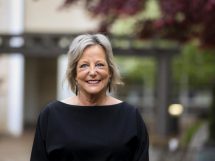
LOUISVILLE, Ky. — With one of Kentucky’s premier certified hand therapists serving as a lead instructor, Spalding University’s Auerbach School of Occupational Therapy is offering a new graduate certificate and post-professional doctoral track in Upper Extremity Rehabilitation. Unique to this region, the programs will provide occupational therapists with advanced knowledge of the complex physiology and occupations of the hand and arm as well as training in how to evaluate and treat upper-limb injuries.
Spalding is now accepting applications for fall 2020 at spalding.edu/upper-extremity for both the certificate and the post-professional Doctor of Occupational Therapy (OTD) track. Assistant Professor Dr. Greg Pitts, a licensed OT and certified hand therapist who owns and operates Commonwealth Hand Therapy clinic in Lexington, will teach multiple courses.
The 15-credit-hour certificate program in Upper Extremity Rehabilitation consists of three five-hour courses presented in a hybrid format of online instruction and face-to-face skill development. Applicants must have a professional degree along with certification or licensing in occupational therapy or physical therapy.
The 30-hour post-professional OTD track, meanwhile, is designed for licensed occupational therapy practitioners who want to progress to the full doctoral degree. It involves five 13-week courses of online instruction blended once a trimester with in-person testing. It includes a three-hour course in upper-extremity wound care. A self-directed capstone is the final requirement.
“These Upper Extremity Rehabilitation programs are really going fit a need – and not only in the Louisville area,” said Dr. Rob McAlister, Chair of the Auerbach School of Occupational Therapy. “Because the classes are primarily online, we can also serve the rest of the country and even beyond the limits of our country if a person can come to Louisville once every three months for a weekend. Then that person can attain a credential that really makes them more marketable in their profession.”
In addition to teaching the scientific principles related to upper extremities and injuries, Spalding’s new programs will also place an emphasis on teaching management skills and business applications in an upper extremity rehab clinic.
“Our dream was to develop a program where a post-professional occupational therapist could come to Spalding and learn real-world applications for both basic and complex orthotics and develop skills that will help perpetuate their careers,” Pitts said. “Students will also develop an understanding of the value of mentorship and the value of science as they apply it to the treatment of patients. You can become a very valuable employee because you can learn to help manage therapists and help provide good functional outcomes. You can become a leader in upper extremity rehab.”
Pitts is well-established as a leader in the field. He is the past chair of the American Hand Therapy Foundation, and he is currently on the board of the Hand Therapy Certification Commission. For years, Pitts has served as Clinical Director for On-Site Rehabilitation for Toyota Motor Manufacturing in Georgetown, and he is a past recipient of Kentucky’s Outstanding Occupational Therapist of the Year Award.
“Dr. Pitts is so passionate and so knowledgeable,” McAlister said. “He is a nationally recognized authority on upper-extremity care, and he is one of the foremost practitioners in the country. He owns his own business, so from a practitioner’s standpoint and from a business standpoint, he knows what it takes to succeed, and he can communicate that knowledge really well to students. The faculty teaching in these programs are world-class.”
Spalding Dean of Graduate Education Dr. Kurt Jefferson said the Upper Extremity Rehabilitation certificate and post-professional OTD track “continue the important tradition of Spalding’s occupational therapy program expanding its footprint both academically and clinically in Louisville and beyond.”
He continued: “The opportunity for healthcare professionals to gain continual knowledge and expertise in this area will benefit practitioners in important intellectual and professional ways.”



















Add Comment